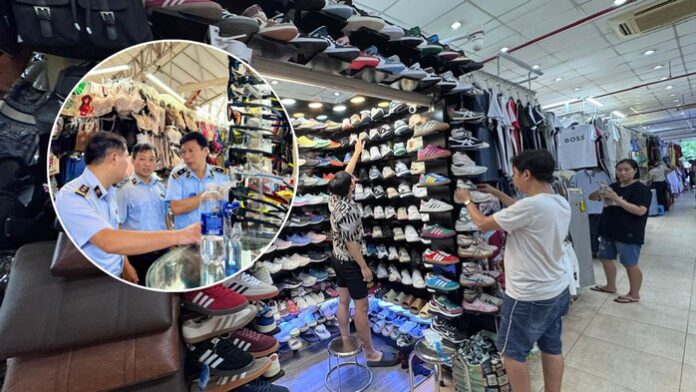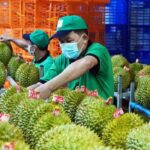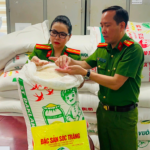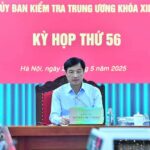Crackdown on Counterfeit Goods in Vietnam: Saigon Square’s Cat-and-Mouse Game
On the afternoon of May 30th, reporters from NLD witnessed business as usual at Saigon Square in District 1, Ho Chi Minh City. Stalls were open and bustling with a wide range of foreign-branded goods on display, catering to both international tourists and local consumers.
A Game of “Catch and Release”
Just the day before, six task forces from the Market Management Department of the Department of Domestic Market Development and Integration – under the Ministry of Industry and Trade – had conducted simultaneous inspections at the center.
Notably, as soon as the inspection team arrived, the security guards’ walkie-talkies were activated, and a warning was broadcast over the intercom, alerting vendors to close their shops and hindering the inspection and handling of violations. However, the authorities discovered thousands of counterfeit products bearing famous global brands, including watches, bags, wallets, and sunglasses, severely affecting consumers’ rights and the reputations of protected trademarks in Vietnam.
According to IPT Intellectual Property Consulting Company Ltd. – the representative for trademark protection of renowned brands such as Rolex, BVLGARI, and Chanel – most of the products handled by the inspection team bore signs of trademark infringement. Specifically, the packaging of the goods sold in some stalls did not conform to the standards set by the brands, with uneven and loose stitching, and even stray threads. The logos or printed text on the products were blurred and lacked sharpness. Notably, these products were sold at much lower prices than the authentic items.
In addition to IPT, numerous law firms and intellectual property law companies, representing various trademarks, were also present at Saigon Square to identify potential violations in the displayed goods.
It is important to note that this is not the first time this center has been inspected and found to be selling counterfeit and imitation goods. Over the years, market management forces have conducted surprise inspections and seized large quantities of infringing goods. However, the situation persists, and after a short period, the stalls resume their open display and sale of counterfeit goods as if no action had ever been taken.
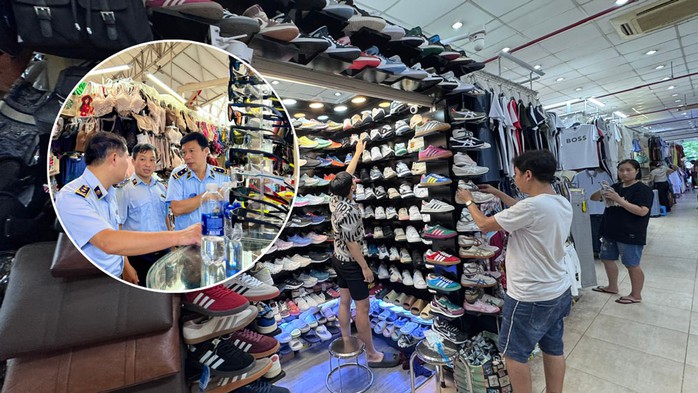
Saigon Square stalls open for business as usual on May 30, following the inspection the day before. Small picture: Market management forces inspecting a stall at Saigon Square on May 29.
Mr. Tran Viet Hung, Head of the Market Management Department of the Department of Domestic Market Development, stated that Saigon Square is one of the typical cases targeted during the peak month of inspections for counterfeit, substandard, and poor-quality goods directly conducted by the department. Being a central area that attracts numerous domestic and foreign tourists, Saigon Square will continue to be under frequent scrutiny in the future.
Mr. Hung also emphasized that the lax management of the area not only facilitates blatant violations of trading practices but also severely damages consumer trust. Furthermore, the proliferation of counterfeit and imitation goods tarnishes Ho Chi Minh City’s image in the eyes of international visitors and negatively impacts the healthy business environment for legitimate enterprises.
However, according to Ho Chi Minh City’s market management forces, current regulations only allow for the transfer of cases to investigative authorities when the value of counterfeit goods exceeds 200 million VND. For cases with lower values, the functional forces can only impose administrative sanctions for offenses such as trading goods without invoices or proof of origin or for infringing intellectual property rights. Even if a foundation is a repeat offender after two years, the measure is limited to increasing the administrative fine, not meeting the conditions for transferring the case to investigative authorities. As a result, many violating establishments are willing to pay the fine to continue their business operations, regardless of the risks and negative impacts on the market.
The Need for Stronger Penalties
In an interview with NLD, Ms. Vu Thi Huyen, legal representative of React Anti-Counterfeiting Organization in Vietnam and Director of THB LAW LLC, pointed out that places like Saigon Square, Ben Thanh Market, and wholesale markets are hotspots for counterfeit trading activities. Despite continuous enforcement, the high profitability leads to a prevalent recurrence of violations. She questioned the effectiveness of the current enforcement measures.
Ms. Huyen explained that the perpetrators of counterfeit trading are very cunning and often counter enforcement forces by closing shops, disposing of goods, or prolonging inspection times. On the internet, the use of fake information, addresses, and virtual warehouses hinders the tracing and handling of violations. Additionally, they use private homes, apartments, and containers as warehouses, obstructing inspections.
Another reason for the lack of effectiveness in handling these cases is the leniency of administrative penalties. In many criminal cases, the punishment is mainly probation or fines, lacking deterrence. Therefore, she proposed increasing the penalty level and allowing for compensation claims from the right holders, even multiples of the value of the counterfeit goods, to protect rights and enhance deterrence.
According to Ms. Huyen, counterfeiting is a pressing issue for both enforcement agencies and affected businesses. The campaign to crack down on counterfeit and smuggled goods, as directed by the Prime Minister, is expected to make a stronger and more effective impact. However, addressing counterfeiting cannot be done overnight but requires a coordinated effort from multiple fronts. The legislature needs to update laws that reflect reality, enforcement agencies must act decisively without forbidden zones, and right holders should proactively protect themselves by employing technical measures and distinct identification features to facilitate the recognition of genuine products.
Additionally, Ms. Huyen suggested enhancing the responsibility of intermediaries such as shipping companies and e-commerce platforms, who sometimes benefit from the circulation of goods and inadvertently aid illegal activities.
To increase deterrence and curb the production and trading of counterfeit and imitation goods, the Ministry of Industry and Trade is seeking feedback from relevant units on a draft government decree on administrative sanctions in the fields of commerce, production, trading of counterfeit and banned goods, and protection of consumer rights. The draft proposes increasing the maximum penalty to 200 million VND for individuals and 400 million VND for organizations, along with additional stronger sanctions to enhance deterrence.
Specifically, besides fines, supplementary penalties include: revocation of licenses or practice certificates for one to twelve months, suspension of operations for the same period, confiscation of infringing goods, destruction of infringing goods, and recovery of all illegal profits obtained from the violation.
Notably, in cases where the value of counterfeiting is equivalent to or exceeds 30 million VND, or where illegal profits reach or exceed 50 million VND but do not meet the criteria for criminal prosecution, individuals and organizations will be fined between 70 and 100 million VND, instead of the previous range of 30 to 50 million VND.
For the acts of producing, importing, or trading counterfeit goods such as food, drugs, cosmetics, medical equipment, chemicals, etc., the penalty will be doubled compared to the standard fine if it does not meet the criteria for criminal prosecution.
Amending Laws to Close Loopholes
On May 30, the Prime Minister’s Task Force on Intensifying the Fight against Smuggling, Trade Fraud, and Counterfeiting, led by Deputy Minister of Industry and Trade Nguyen Sinh Nhat Tan, worked with Hanoi authorities. The Deputy Minister requested that Hanoi’s functional forces strengthen inspections with the spirit of being “strong, fast, accurate, and strict,” especially in hotspots like Quang Minh Industrial Park, Hapulico Medicine Market, Ninh Hiep Market, and craft villages, which are prone to violations.
At the meeting, the Hanoi Steering Committee 389 proposed that the National Assembly, the Government, and ministries and sectors promptly amend and supplement legal documents to overcome existing loopholes. Specifically, they suggested adding content to Decree 15/2018 to tightly manage food safety and handle violations of false advertising; unifying and assigning the Ministry of Health as the main agency responsible for food safety.
Additionally, Hanoi proposed amending the Penal Code and administrative sanction decrees to increase penalties for intellectual property rights violations, misleading advertising, and exploiting the internet for personal gain. They also recommended legal provisions for the activities of KOLs/KOCs, including business registration, public disclosure of identities, and accountability for promotional content.
Unveiling the Deception: Over 17 Tons of Counterfeit ST25 Rice Flood the Market
With a cunning and deceptive scheme, Pham Thi Anh Tuyet and her accomplices packaged and sold cheap rice with the prestigious label of ST25 Rice – Shrimp. This fraudulent act deceived consumers and undermined the reputation of the esteemed ST25 brand.

